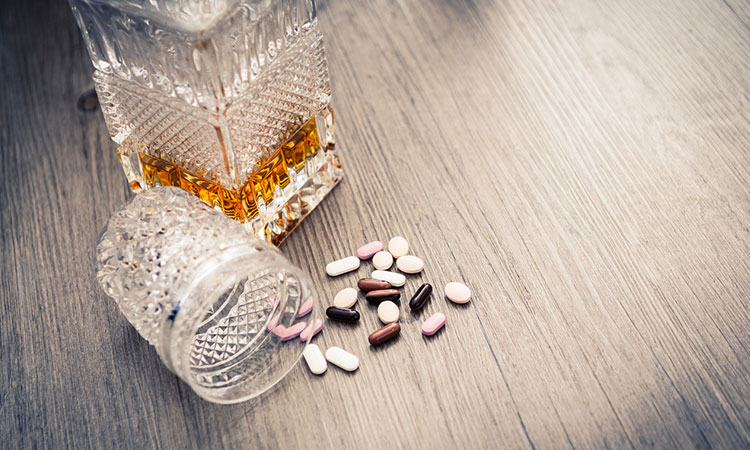
The prescription opioid Vicodin, a combination of hydrocodone and acetaminophen, is often prescribed after a surgical procedure or for those experiencing severe pain. Unfortunately, the drug can be highly addictive, even if taken as prescribed. As with other opioids (such as heroin, oxycodone, and fentanyl), abusing Vicodin in any manner can be fatal.
These risks are amplified when Vicodin is combined with alcohol. Many people purposefully mix Vicodin and alcohol. The effects of each complement the other, and people will feel more euphoria from the Vicodin and more relaxed from the alcohol. It is a typical drug cocktail among drug users and alcoholics.
Combining alcohol and Vicodin causes: drowsiness, dizziness; risk for overdose; slowed or difficulty breathing; impaired motor control; unusual behavior; memory problems. (NIAAA)
Effects of Alcohol and Vicodin
Alcohol and Vicodin are both depressant substances. Consuming either one slows down the body’s functions, especially the respiratory system. It’s a fact – combining Vicodin and alcohol often results in respiratory failure and death. In addition, there are other chemical interactions from the Vicodin, which are also harmful. Part of the ingredients in Vicodin is Acetaminophen, which is the generic name for Tylenol.
Consuming too much acetaminophen will damage the liver. Alcohol also causes liver disorders especially when a person drinks heavily. Drinking alcohol and taking Vicodin is extremely bad for overall health in terms of liver harm. High intake of Acetaminophen and alcohol causes:
- Hepatic cirrhosis
- An acute liver failure
- Hepatitis caused by alcohol
- Fatty liver
- Death from liver disease
Other Complications From Alcohol and Vicodin
When Vicodin and alcohol are abused simultaneously, the side effects can be severe, particularly if a person regularly combines the two. Physical dependence will also develop when someone uses an opioid regularly like Vicodin. Similarly, physical dependency also happens when a person drinks alcohol every day. Both substances also cause withdrawal symptoms. Alcohol and opioid withdrawal symptoms are relatively similar.
Yet, alcohol will cause far worse anxiety, and opioids will make the person feel more significant nausea and flu symptoms. Still, both substances cause rapid heart rate, insomnia, and muscle and body pain. In addition, the physical dependence on each of these substances requires medically supervised detox where safe and effective medications are prescribed to minimize and subdue withdrawals.
What Do The Professionals State About These Drugs?
The National Institute of Health researchers have studied the harm when someone combines Vicodin (hydrocodone) and alcohol. They find that the people who do this are substance abusers likely to be addicts and alcoholics.
In studies of patients taking opioids [hydrocodone]for chronic non-cancer pain, approximately 30 % of patients have demonstrated opioid or another substance misuse. The concomitant use of alcohol and opioids is of particular concern, given that a personal or family history of alcohol abuse is strongly predictive of the misuse of opioids for chronic pain. In 2011, of the 606,653 emergency department visits associated with drug misuse or abuse involving drugs and alcohol taken together, 103,730 (17.1 %) were for opioid products. (NIH)
Treatment at Riverwalk Recover for Alcohol and Vicodin Addiction
The first necessary step for anyone abusing Vicodin and alcohol is to be admitted quickly to the medically supervised detox unit. Without medical assistance, these individuals run the risk of heart and liver failure, relapse that causes accidental overdose, and other serious medical emergencies.
Our medically supervised detox for alcohol and opioids provides safe medications to help them get through withdrawals and become stabilized. Following detox, an inpatient treatment program must be next. Anyone abusing these two substances needs help figure out why they self-medicate with such potent substances.
Call For Priority Admission to Our Inpatient Alcohol and Opioid Treatment Programs
We recommend for patients abusing alcohol and Vicodin be admitted to inpatient followed by intensive outpatient for a total of 4 months of treatment. Riverwalk recovery has the expertise and experience. We rely on evidence-based, holistic, behavioral, and regular one-on-one counseling. Call for priority entrance and chat or email for more help.
